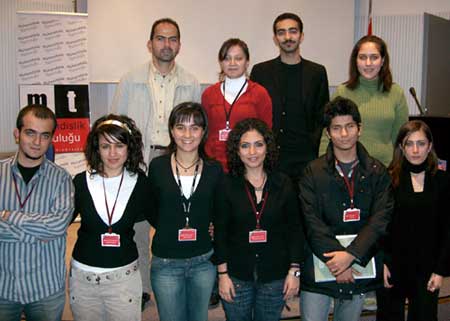|
|









|
|
|
|
Nasuh Mahruki: A Leader Since
His Years at Bilkent |

Nasuh Mahruki, the founder of AKUT (Arama Kurtarma Derneği / Search and Rescue
Organization), and a 1992 graduate of Bilkent's management department, visited Bilkent to
motivate Bilkent students about leadership at a conference organized by Mühendislik
Topluluğu. As a student at Bilkent, Nasuh joined DOST (Mountaineering and Nature Sports
Club), and served as the president of the club for three years. After graduation he
climbed several mountains including K2, an 8611-meter mountain in Asia, the summit of
which only a few climbers have succeeded in reaching due to the perils involved in the
climb. Bilkent News interviewed Nasuh Mahruki about his career.
Bilkent News: What prompted you to form AKUT?
Nasuh Mahruki: After a climbing accident in 1994, many climbers worked on
the rescue team formed as a response to that accident. After this accident I, and about
ten other climbers, had a meeting and decided to formally organize climbers for such
emergencies in the future.
Bilkent News: Have you ever hesitated when faced with the responsibility
of leading AKUT, which is charged with great responsibilities during rescue operations?
Nasuh Mahruki: I have always had great responsibilities. My professional
sports career also improved my leadership skills and prepared me for great
responsibilities and then AKUT occurred. Of course it is very different! AKUT has huge
responsibilities and the work we do is arduous and dangerous but the quality of the people
in AKUT is very high. Therefore, we lead and work together and it becomes easier.
Bilkent News: How have you benefited from your education at Bilkent?
Nasuh Mahruki: Actually, my academic education is always reflected in my
life. Leading AKUT is completely based on my academic education and the leadership skills
that I learned at Bilkent University. Consequently, I use these skills in volunteer
activities as well as in the seminars that I give to companies to motivate them on the
subject of leadership.
Bilkent News: What have you gained from leading DOST?
Nasuh Mahruki: My whole life changed because of DOST. I think attending
Bilkent University and moving to Ankara were some of the best choices I made in my life
because I was not aware of the opportunities and passion inherent in nature and the
outdoors until I attended university. Ankara is a very cultural city and when I was
studying, the people who were occupied with climbing and outdoor sports had diverse
interests. All of them were interested in theatre, art and philosophy. They were both
spending time participating in outdoor activities and were also attaching great importance
to philosophy and culture. As a result of these experiences, Ankara and Bilkent University
helped shape my life. With the help of outdoor sports, I realized the extent of my
capabilities when working with people. I had a chance to experience how to lead people and
how to form an administration board. Actually, Bilkent University taught me lessons in
life, not just academics.
Bilkent News: What advice can you give to Bilkent students who want to
follow their dreams and be the leaders of the future?
Nasuh Mahruki: I think the most important advice I can give is to know
yourself. Students should try to learn what their skills and abilities are and to improve
them. They should stay focused on their goals while also following current events and
technology. Finally, students, and all people, have to work together by uniting their
powers to reach their realistic targets.Yeşim Şağban (IE/III)

|
|
|

|







